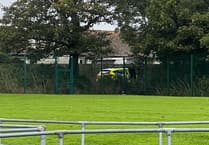The power of social media to promote positive and negative (and, indeed, false) messages is well documented, but we did not anticipate such a strong reaction to a Facebook post we made last week.
It read as follows: ‘Can you help? We were called out to a distressing welfare incident last Tuesday, March 8.
‘An (otherwise healthy) male wallaby had been shot in the head and had managed to hop, and then collapse, onto the driveway of a property in Glen Audlyn.
‘We rushed him to the vets where he was put to sleep due to the extent of his injuries.
‘As the law stands, hunting and shooting wallabies is not illegal on the island because they are classed as a non-indigenous species and therefore they are not protected by the Wildlife Act 1990.
‘However, this poor animal was shot with a firearm that wasn’t powerful enough to kill a medium sized mammal outright - a firearm designed to shoot rabbits and pheasants.
‘We need to make sure whoever did this understands the ramifications of using an inappropriate firearm, and the pain and suffering they have caused. If you know who this might be, please help us to prevent this happening again.
‘Better still, help us promote wallabies as a wonderful addition to our Manx countryside, and allow natural selection to control the population.’
The post was viewed by almost 40,000 people and attracted 195 individual comments.
We have also been contacted be phone and e-mail by people who, like the Facebook contributors, did not realise that our wallaby population is ‘fair game’ for hunters as long as they hold a firearm legally.
The issue is rooted in the question: why are wallabies not classed as wildlife, and therefore protected by the Wildlife Act?
The simple answer is that wallabies are a named Invasive Non-Native Species (INNS) and they are viewed as ‘a problem in their new environment, whether through rapid and extensive spread, outcompeting or damaging native species, or even affecting human activities’ (www.gov.im).
Let’s examine this in more detail.
An INNS is deemed to be new to its environment.
But the island’s wallaby population has been around for almost 100 years, having escaped from private collections and then establishing itself mainly in the northwest.
What native species is the wallaby population affecting?
As vegetarians, wallabies do not predate smaller animals or disrupt the food-chain – in fact, they are a benign presence amongst wildlife species.
Some conservationists claim that wallabies eat rare flora and fauna, but there is no evidence to suggest that the wallaby diet differs from that of other vegetarians such as rabbits and sheep.
How does the wallaby affect human activities?
Some farmers claim that their grazing land is affected by wallabies, leaving less for their sheep to eat, but it is widely believed that wallabies live mainly in and around our plantations (i.e. not on farmland).
This is why we rarely see them, because they are shy animals and like to stay under the cover of bushes and long grass (they are also crepuscular which means they are mostly active at dawn and dusk).
And what is a native species?
We think of British native species as animals like rabbits, brown hares, or hedgehogs – anything that appears on your typical episode of Countryfile. But are they really ‘native’?
Many animals have been deliberately introduced throughout history and released into the wild.
Rabbits, for example, were only brought to the shores of England by the Romans as a source of food and released into the wild around the 12th Century.
The definition of what is and isn’t native is even more difficult on the Isle of Man.
As an island, should our native animals only be classed as what was present here when we broke off from Great Britain around 10,000 years ago?
We believe that the only way forward is for there to be a government-funded, independently peer reviewed, research project into the impact wallabies have on the island’s environment.
We are confident that the project will conclude that the wallabies are not a threat to the Manx environment, and that they should be viewed as an asset – even a tourist attraction.
Meanwhile, wallabies should be afforded the protection given to native wildlife on the island, so that they cannot be hunted and killed with impunity.
If you agree, please contact your MHK with your views and help us to bring about much needed change.


.jpeg?width=209&height=140&crop=209:145,smart&quality=75)


Comments
This article has no comments yet. Be the first to leave a comment.